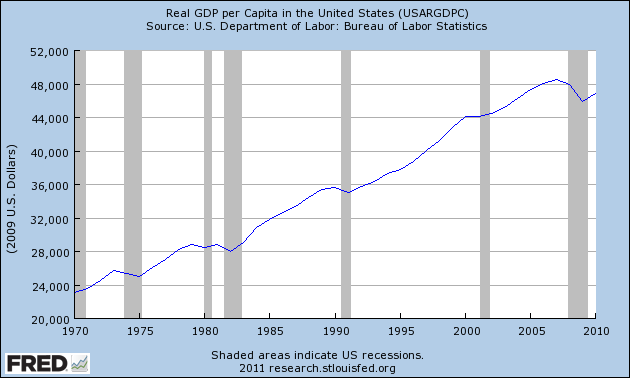
In the discussions of why things are so bad, why incomes have not risen, why poverty keeps climbing, and why inequality is so severe, people should keep in mind one basic statistic: the US GDP per capita has doubled since 1970. Or to put it in more simple terms, the United States economy is producing twice as much stuff per person as it did 40 years ago.
Despite this massive growth, poverty has risen, the wages of most have stagnated or fallen, food insecurity has risen, people are calling to raise the retirement age of all things, and the public as a whole is being fed a nonsense line about how we do not have enough money to solve the human woes caused by economic deprivation.
This is absurd. We have way more money (or more accurately economic output) than we have ever had; it is just all being distributed to the richest 10% of the population. Solving the problems caused by economic inequality is going to require distributing products differently. Regardless of what commentators might say about the rise of China and India, or outsourcing, or automation, we should never forget that we are still producing twice as much stuff per person as we did 40 years ago. Whatever effect those other things have had, they are secondary to the extreme mal-distribution of products. If we distributed products (or income which is just a proxy for distribution of products) differently, none of the other factors would matter: the standard of living for everyone would have been improving.
It is also important to remember how we got here. The right-wing — led by Milton Friedman — was very successful in convincing people that economic growth was all that mattered. They argued — probably disingenuously — that inequality did not matter, and that orienting policy to the rich would be best for all because it would increase growth, the benefits of which would “trickle down” to everyone. After 40 years of these policies failing to generate a “trickle down,” this approach should not be taken seriously by anyone. Without some way for the 99% (or more accurately the 90%) to capture some of the benefits of economic growth, the whole enterprise of pro-growth policy is just a giveaway to the rich.